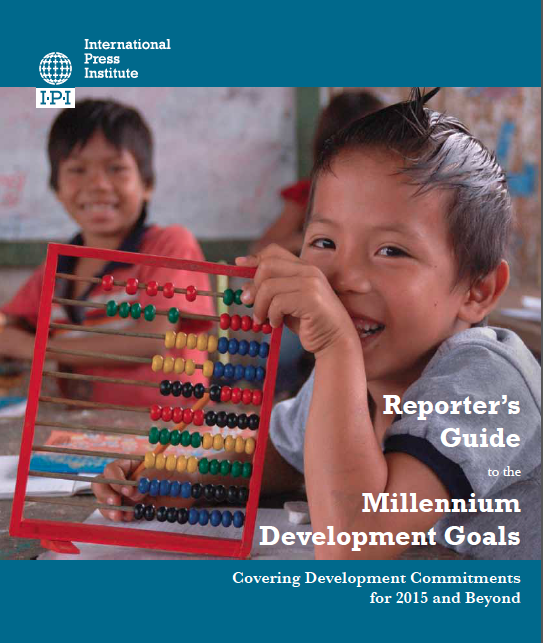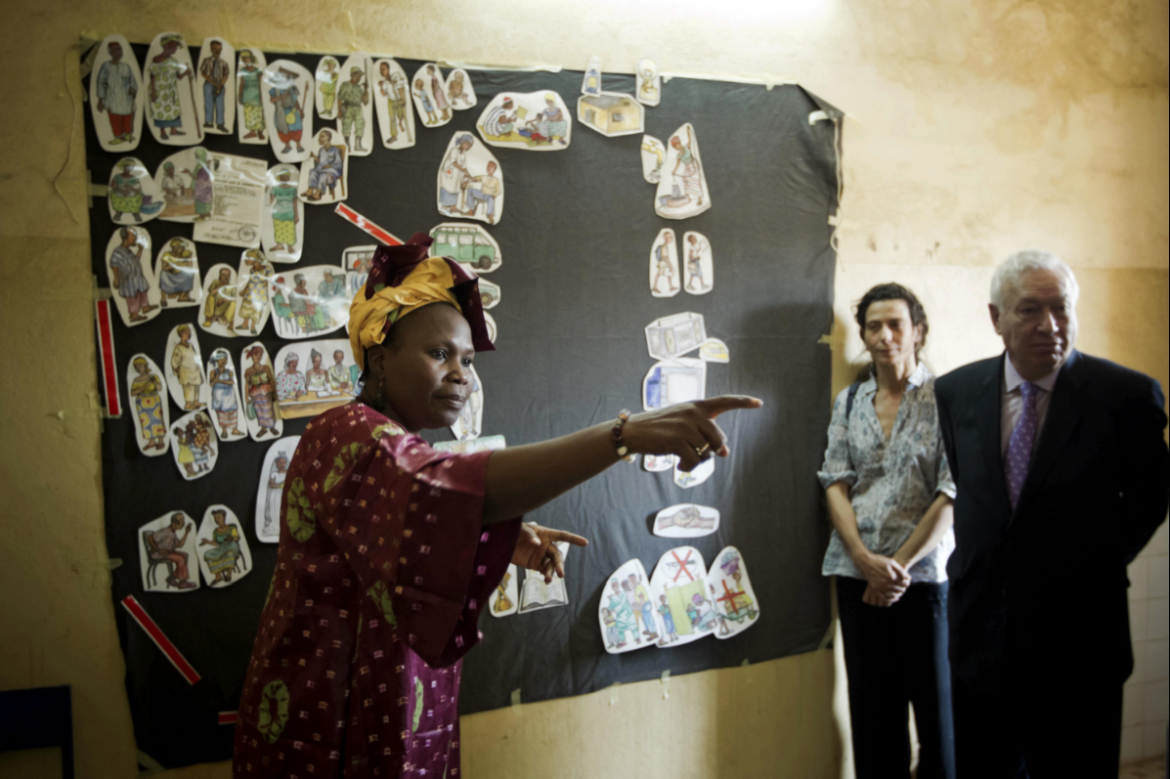 Part 12 of a series GIJN is excerpting from the Reporter’s Guide to the Millennium Development Goals: Covering Development Commitments for 2015 and Beyond, published by the International Press Institute.
Part 12 of a series GIJN is excerpting from the Reporter’s Guide to the Millennium Development Goals: Covering Development Commitments for 2015 and Beyond, published by the International Press Institute.

There are the two essential questions a reporter covering business, the economy, or just about any topic should always ask: “How much does it cost?” and “Where will you get the money from?”
These simple questions are not only key to gaining information about your current story’s topic, but they offer greater insight into reasons for decisions that have a direct impact on a country and its citizens.
Everything has a price associated with it—even the most humanitarian of efforts. Money is the backbone of all things. Once you figure out from where a business, government or non-profit group receives its money, and how the money is used, it’s a little easier to understand and write about broader, sweeping issues.
Government Cash
Depending on the country and its level of development, money for government-funded efforts can be raised from sales, income, or business taxes; permits and licenses; and royalties/taxes from the extraction and exportation of natural resources. In less-developed countries, funds often come from development and donor aid (examples: the World Bank, United Nations, or Care International).
Know Your Budget
You should be aware of how much money (revenue) a country, state, or province is bringing in each year, or if it lacks enough money to pay government workers, run state-owned hospitals, or fix roads (known as running a deficit.) This information is usually contained in an annual budget.
Knowing where to find a nation’s annual budget, and being able to read it properly, is key. A budget will give you a good idea of how much a government plans to spend in the coming year, and will list how much it spent in the current and previous years.
In more-developed nations, budgets can be found online at government websites, particularly ministries of finance, or sites for budget or tax-collection offices. In less-developed countries, you may not be able to find this information online, so you may have to request a copy of the budget in person.
If a budget must be approved by a parliament or other governing body, these political avenues could be useful in the quest for a copy of a budget, considering politicians will likely want to hold debates over expenditures listed in the budget. Regardless of the country, some politicians and citizens may feel a government is spending too much in certain areas or not enough in others. Others will argue over proposed cuts to certain departments or agencies.
Be sure you know how to read the columns in a budget properly, following the given guidelines to compute the currency amounts in thousands, millions, or billions. Also, be sure you know how to calculate percentage changes.
If the government has a surplus, meaning money left over after all its bills are paid, you should feel free to ask if this money will be saved or spent to increase services for citizens or on other things, like defense.
When There Isn’t Enough Money
If a government is operating with a deficit, meaning spending more money than it is taking in, it is fair to ask officials how the government will make up for that shortfall. Ask if it will take on loans from other governments, issue government-backed bonds, or receive donor aid.
Issues surrounding money—particularly budget deficits—are often sensitive areas for officials, mostly in less-developed nations, as they must often rely on donor aid or loans from the World Bank to make up for financial shortfalls.
Remember that questions about finances are neutral, and should be asked by savvy reporters regardless of the political party in power. Be sure you approach officials— particularly heads of ministries and departments—respectfully. You should seek to develop positive, lasting relationships with heads of finance and trade, and key government advisers.
The Money behind the MDGs
A government announcing a free health-care program for pregnant women and children under five years old may be looking to meet the Millennium Development Goals (MDGs) related to child and maternal health. But bear in mind that someone must pay for additional doctors, nurses, medications, and other necessities needed to give more people access to health care. It’s obviously a large undertaking, so it is fair to inquire about costs. The head of the ministry of health or similar department should be able to answer your questions, considering they are in charge of the project.
“Can you tell me how much this program will cost, and what sources you will use to pay for it?” is a very neutral, casual question in comparison with, “What did you do with the money for this project? I don’t think the country can afford this.” Your tone should be confident but never accusatory. This is important when asking about specific projects or initiatives that often get much fanfare. Your readers/listeners/watchers will want to know this information because it could affect their everyday lives.
Regardless of what you may know from other sources, never imply that any corruption is involved. Feel free to ask if tax increases are involved, although raising taxes on people or business is never a happy topic.
Should an official fail to answer the question, feel free to ask if he/she knows of another source you should speak to, to get the answer. If you are dealing with a hostile official, your publication should allow you write about your failed attempt to gather that information: “The ministers of health and finance declined to answer questions about how much the project costs or offer details on how it would be funded.” Be sure to document these exchanges carefully or use a voice recorder.
Development Aid
Much of the progress made towards achieving the MDGs is due, in part, to money coming from development aid groups. Bodies such as the United Nations and World Bank have spent billions around the world organizing and running projects. Non-governmental organisations (NGOs) are also pouring money into programs in various nations in an effort to help them achieve several MDGs.
To figure out how much a group is spending in a particular country, journalists should look to online documentation, as much information is public. Keep in mind that many NGOs in their home country are required by law to make their budgets or annual reports public.
But figures contained in annual reports can differ from the actual amount being spent helping people in your country. According to Tamika D. Payne, an independent gender expert based in Sierra Leone, journalists should ask, “How much money is being spent on direct beneficiary support?” She points out that knowing some “NGO lingo” is often useful and lets the person you’re interviewing know you have a better understanding of the issue, so they’re likely to provide a better answer. That kind of question forces the NGO to separate how much is being spent on overheads and other operational costs, such as paying its employees and transportation. “If $10 million is being earmarked for a new school, for example, journalists need to ask how much of that money is going to boys and girls in the school, for things such as books,” says Payne. “That amount of money is different from the overall cost of building the school.”
Poverty, Employment, and the Private Sector
Nations are going to take several approaches to reduce poverty levels. Improving the economic fate of families—particularly women—and educating them will go a long way on the road to ending poverty. Journalists need to understand the connections between these issues.
The only way to reduce poverty is for people to earn more money. To do so, they need jobs, jobs that pay a fair wage on a consistent basis. How government officials will create more jobs for their citizens is a fair question that should be asked often.
Developing nations are keen to attract investors, or companies from more-developed nations. When this happens, journalists should not be afraid to question these businesses about their intentions in the country. Ask questions about incentives, or special financial awards the company received in exchange for setting up in the country (land, and discounted taxes, royalties, or tariffs are common).
Feel free to challenge businesses on whether their development will consist of all local workers. If not, what percentage, or how many local people, will be hired? How much will these workers be paid?
It is easy to relate these responses to the MDG on reducing poverty and raising employment levels, as the jobs are bound to have an impact on the economy.
Reporters may often have to be a bit more aggressive—but not accusatory—in their questioning of businesses. If the company is public, meaning its shares are traded on a stock exchange, reporters can find documents about the company’s financial health and investment plans online. To find answers about questions specific to a company’s project in a country, reporters may often have to call or e-mail someone in the country where the company is based, if a local representative cannot answer questions.
Trade and Debt Forgiveness
Developing countries are gaining greater access to markets of developed countries in terms of trade. The biggest benefit comes from tariff reductions on agricultural products.
Journalists should be familiar with products grown and exported from their country, and how much is sold to other countries. Speaking with officials from trade ministries and departments is key.
Because of budget shortfalls, many developing nations have a significant amount of debt on their books. 39 countries are eligible for debt relief under the Heavily Indebted Poor Countries (HIPC) initiative as of April 2013. Journalists in these nations should be aware of this status and the efforts the country needs in order to have some of that debt wiped away. Ask how much of the debt will be forgiven and the effect that easing will have on the economy.
Where To Look for Help
Tracking statistics on development aid can be a difficult task. One useful place to start is the aid database at the Organisation for Economic Co-operation and Development. Other places to begin researching are AidData and the International Aid Transparency Initiative. But remember that the official numbers tell only a small part of the whole story—one of the key jobs of journalists is to find out where all those dollars and cents ended up.
The International Budget Partnership analyses budget transparency in countries around the world and provides resources for civil society organisations and researchers on how to read and access budgets. In some countries, there may be non-profit groups dedicated to increasing budget awareness among citizens. One example is the Accountability Initiative in India.

Kimberly S. Johnson has spent more than 15 years working at media organizations in the United States and abroad. She is currently a freelance financial journalist based in West Africa and serves as senior reporter for mergermarket, a subsidiary of The Financial Times Group. Johnson also contributes to GlobalPost.com, a news website focused on international news. Prior to that, she served as auto writer for the Associated Press in Detroit and technology writer for The Denver Post. She’s also held positions at the Boston Globe, New Haven Register and CNN.

Excerpted from Reporter’s Guide to the Millennium Development Goals: Covering Development Commitments for 2015 and Beyond. Agreed to in 2000, the UN Millennium Goals comprise an ambitious agenda to improve quality of life around the world, focusing on such issues as poverty, gender equality, and education. This unique manual, available in four languages, offers journalists practical tips on covering these critical areas as we near the 15th anniversary of the goals. Twenty-one journalists across six continents contributed to the report, including several active in GIJN. We are grateful to the publisher, the International Press Institute, for permission to publish the series, and to the European Press Photo Agency and EFE Agency for permission to publish the accompanying photos.

